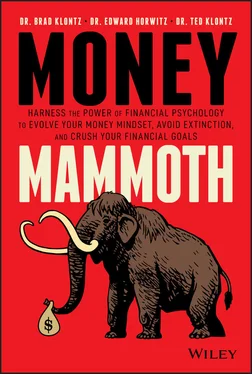YOU ARE WIRED TO TRY TO KEEP UP WITH THE JONESES
In tribal life, ancestors' status within a tribe was a matter of life or death. One of the greatest threats to their survival was finding that they no longer belonged in the group and they no longer had a community to help keep them safe. Our ancestors left on their own would not live long enough to pass on their DNA. So, today, we are incredibly sensitive to whether we belong in a group or not. We are wired to be on constant lookout for cues that we might have lost our place.
In the past, it was critically important that our ancestors kept up on the latest gossip and rumors. Tribes typically consist of 100–150 individuals, so it was a daily task for our ancestors to see where they stood. It was important to know who was mad at whom, and who was in good favor with the leaders of the tribe. Given that our current society is so much larger, we rely on social media and the news to make sure we are not caught by surprise. Watching the news, whether accurate or not, triggers our pleasure centers and gives us hits of dopamine similar to those we get from food and sex. Our brain rewards us for keeping up with the Joneses. For our ancestors, keeping up with the news was a matter of life or death.
ALL THE RULES HAVE CHANGED
Within the past two generations, there has been a dramatic shift away from this tribal social system. Part of the responsibility of the tribe was taking care of each other, including as older people. Over time, as we moved from small tribes to larger groups, this responsibility was passed on to institutions, corporations, and the government. Several decades ago, such entities were there to take care of the tribe. Your company would fund your retirement, and Social Security would step in to take care of the remainder. You saved a little for vacations and holidays, but when and how retirement would occur was not a concern.
What about all this debt? Our grandparents didn't have credit problems. They didn't struggle with credit card debt. Were they wiser? More disciplined? Perhaps, but that's not why they didn't carry massive amounts of debt. The fact is that they couldn't have gotten access to unsecured debt if they wanted it. There was no such money mechanisms as credit cards. The only unsecured credit they were likely to get was from the local grocer, who wasn't likely to extend it more than $100 or less. In the past few decades, we have been given access to easy and fast credit.
But recent cultural shifts have dramatically changed the landscape. Corporations have shifted from defined benefit plans, such as pensions, to defined contribution plans, like 401(k)s. These somewhat subtle shifts have changed the responsibility of saving for retirement from the institutions back to the individual. So we shifted the responsibility of taking care of our aging members from small tribes to the government. In the past few decades, institutions have been discharging this responsibility, but now there are no tribes left to fall back on.
So now it is all up to the individual. This has never happened in human societal evolutionary history, and it is significant to note. You heard this message if you remember the daily briefings after the corona virus outbreak, when self-reliance was called for and lack of government reliance became a reality. This dramatic shift alone helps explain, to a large degree, our society's current financial problems as well. Look at the total global economic impact of the corona virus–related disruptions for businesses, organizations, individuals, and government, and the unintended results from these shifts of societal personal responsibility. Who was most impacted? The poor and the elderly, those groups least able to take on the personal responsibility and who were more dependent on government systems.
So, what can we do? The first step is to move away from lecturing, scolding, shaming, blaming, judging, scapegoating, and treating ourselves or others as if we are flawed or broken. We describe shame as an emotional gluetrap that keeps you stuck. Shame is not helpful. Second, we need to develop strategies to overcome this basic wiring that was essential for our ancestors to survive in the ancient world but works against us in today's world. This book is designed to help you understand your financial psychology, why you do the things you do around money. But we don't stop there. In each chapter, we offer tools to help you both tame your inner Money Mammoth and harness its powers to help you achieve your own ideal financial mindset.
The message here is that, indeed, change is all around. Change is the one inevitable constant in our existence. Some change is for the better and helps us live happier and richer lives, but some change can threaten our literal existence as a species. How can we tell the difference and be prepared? After all, what doesn't kill us makes us stronger, right? However, if we become so smart as a species that we create automated workarounds to address these changes, will it make us weaker and softer? Will those changes sneak up on us like the proverbial lobster in the pot, unsuspectingly boiling us alive? Will we think we are living high and happy, relaxing in the hot tub of life, only to discover too late that we are becoming extinct?
Will we look back to this moment in time and identify these financial trends as the cause of societal collapse which foretold our future? Is this the cause of our extinction? Are we like the mammoths, living in a world that is changing faster than we can comprehend or address? Or will the smartest and most enlightened of our species lead the way to change the trends that threaten our existence? Make no mistake, making behavioral change is hard, and doing so while fighting your genetic instincts will take some expert guidance.
Let's learn from the woolly mammoth and early humanity, and adhere to the lessons evolution has provided. To avoid a life of pain and struggle, let's explore how to take action now through financial awakening and rewiring our financial behavioral actions. Let's evolve and become a new species, the Money Mammoth, who confidently roams the earth and thrives in this new, constantly changing world.
1 1. American Psychological Association, American Psychological Association Survey Shows Money Stress Weighing on Americans' Health Nationwide, February 4, 2015, https://www.apa.org/news/pressreleases/2015/02/moneystress.
2 2. Kathleen Elkins, Here's How Much Money Americans Have in Savings at Every Income Level, CNBC, September 27, 2018, updated October 11, 2018, https://www.cnbc.com/2018/09/27/hereshowmuchmoneyamericanshaveinsavingsateveryincomelevel.html.
3 3. Kathleen Elkins, Here's How Much the Average Family Has Saved for Retirement at Every Age, April 7, 2017, updated July 31, 2017, https://www.cnbc.com/2017/04/07/howmuchtheaveragefamilyhassavedforretirementateveryage.html.
4 4. Federal Reserve Survey, Report on the Economic WellBeing of U.S. Households in 2018, May 2019, Board of Governors of the Federal Reserve, May 24, 2017, updated July 31, 2017, https://www.federalreserve.gov/publications/2019economicwellbeingofushouseholdsin2018dealingwithunexpectedexpenses.htm.
5 5. Kathleen Elins, Here's How Much Money Americans Have in Savings at Every Income Level, CNBC, September 27, 2018, updated October 11, 2018, https://www.cnbc.com/2018/09/27/hereshowmuchmoneyamericanshaveinsavingsateveryincomelevel.html.
6 6. Social Security Fact Sheet, SSA.gov, https://www.ssa.gov/news/press/factsheets/basicfactalt.pdf.
7 7. Bill Fay, Consumer Debt Grows as U.S. Economy Expands, August 27, 2019, https://www.debt.org/2019/08/27/consumerdebtgrowsasuseconomyexpands/.
Читать дальше












